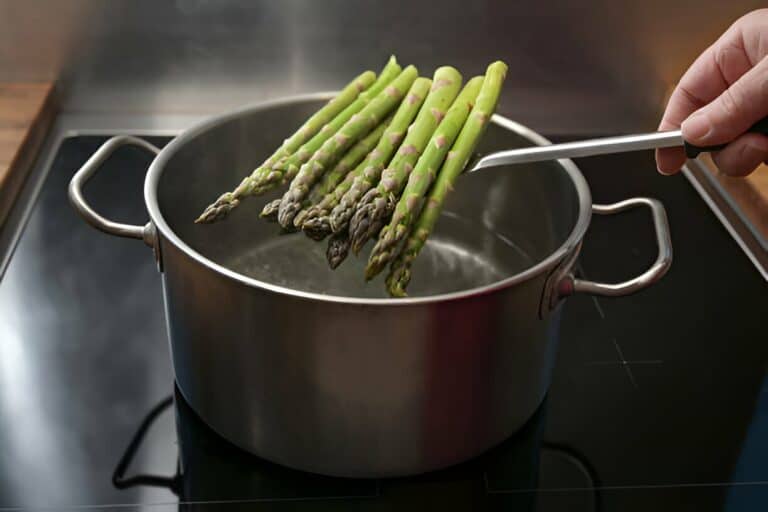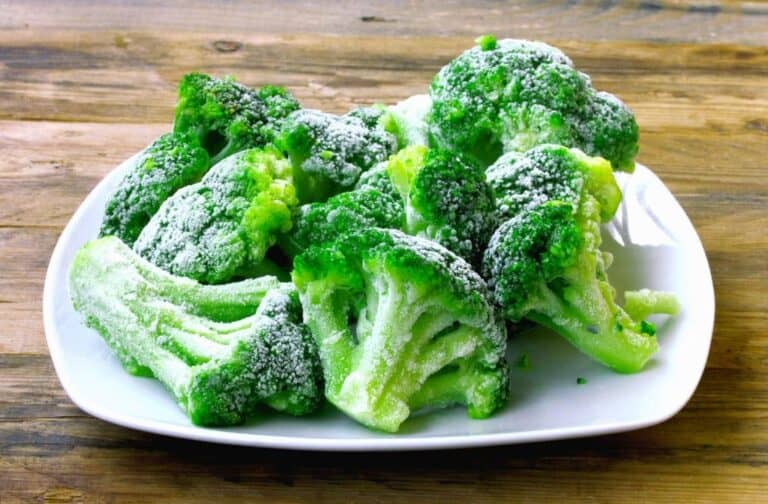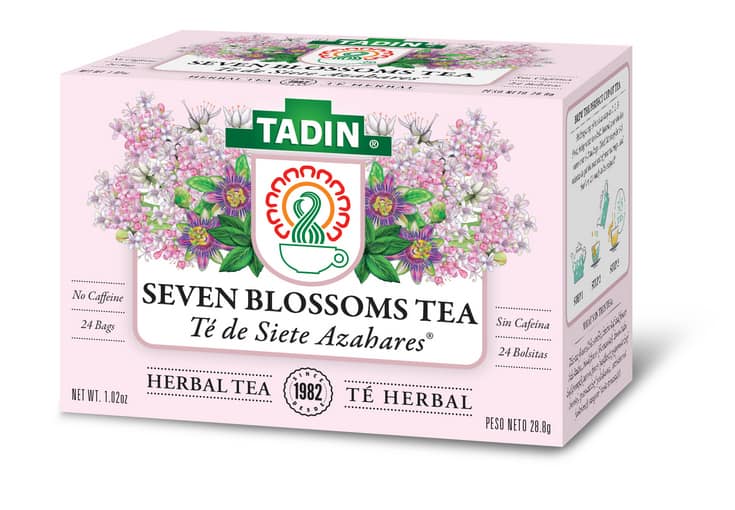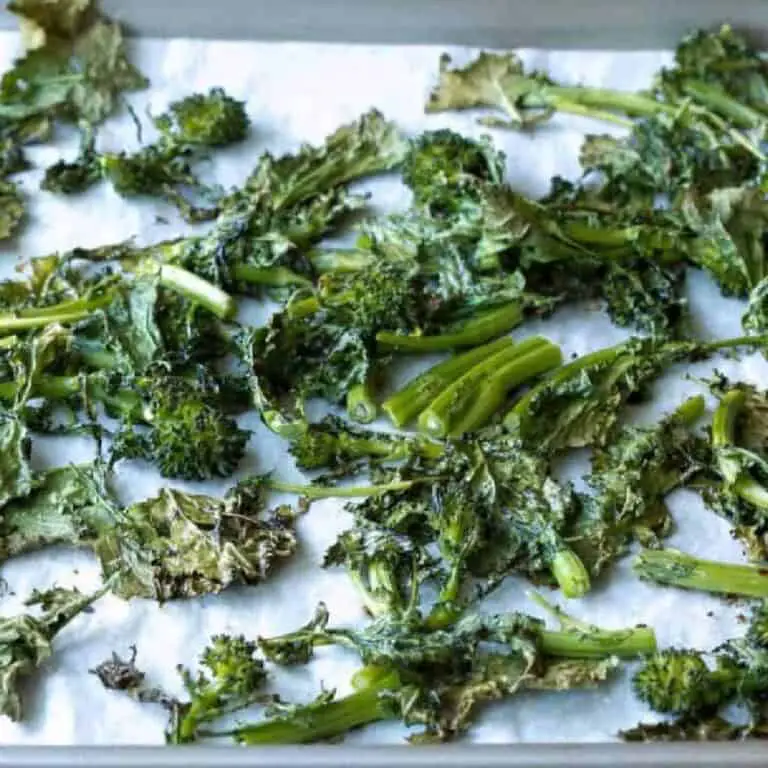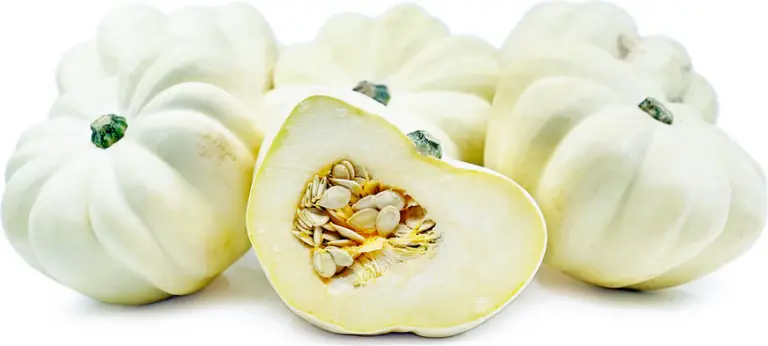Chia Seeds vs. Psyllium Husk: Which is the Better for Digestive Health?
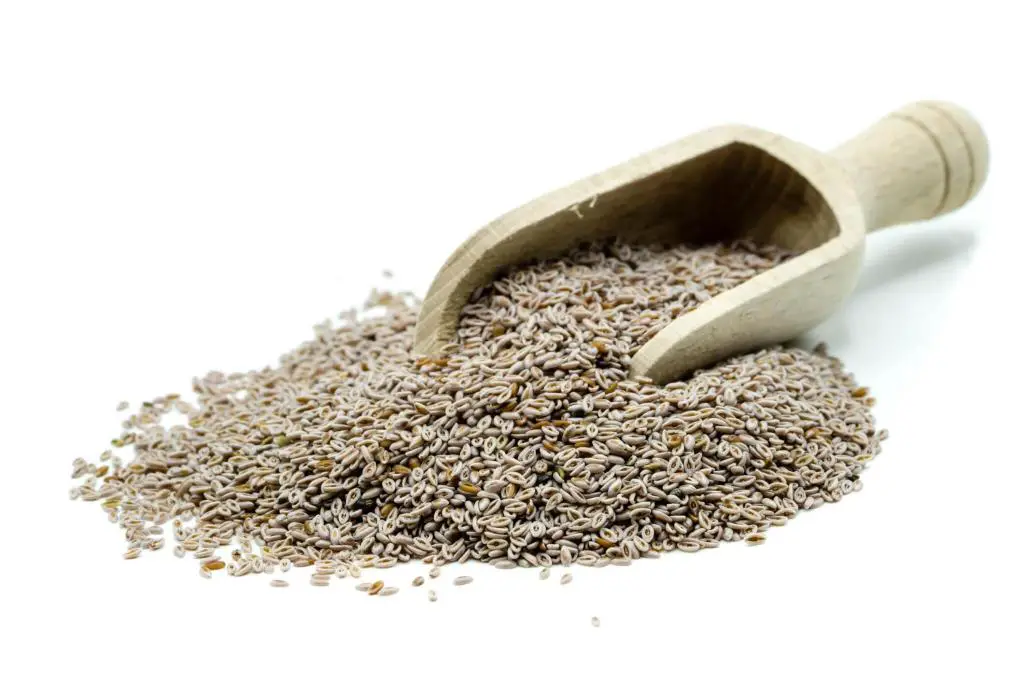
In today’s fast-paced world, many people are turning to natural remedies and superfoods to enhance their overall health. When it comes to digestive health, two popular choices that have gained significant attention are chia seeds and psyllium husk.
These superfoods have been hailed for their potential benefits in alleviating digestive issues such as constipation and bloating and even promoting healthy weight management.
Chia seeds and psyllium husk may seem like humble ingredients derived from plants, but don’t let their unassuming nature deceive you. They pack a powerful punch of nutrients that could potentially revolutionize your gut health.
Chia seeds have garnered attention for their ability to absorb liquid and form a gel-like consistency when soaked or added to fluids, while psyllium husk is known for its high fiber content.
Whether you’re seeking relief from occasional bouts of indigestion or looking for long-term solutions to improve your gut function naturally, exploring the unique properties of these two superfoods will undoubtedly be worth your time.
This article delves into the key differences between chia seeds and psyllium husk in terms of nutritional values, potential side effects, recommended dosages, and how they can be incorporated seamlessly into daily meals—all with the aim of helping you make an informed decision about which one is best suited for your individual needs.
So read on as we unravel the ultimate showdown: chia seeds vs. psyllium husk – which emerges victorious in the battle for superior digestive health?
Introduction to Chia Seeds and Psyllium Husk
Chia seeds and psyllium husk, though perhaps still considered novel to some, have ancient roots deeply embedded in traditional medicine. Let’s uncover the essence of these superfoods, understanding not just what they are but where they come from and how they’ve journeyed into contemporary diets.
Chia Seeds: Origins and Definition
Chia seeds, derived from the Salvia hispanica plant native to Mexico, have been part of Mesoamerican cultures for centuries. Known as “running food” among the Aztecs, these tiny seeds were prized for their energy-boosting properties. Today, chia seeds are a nutritional powerhouse, packed with omega-3 fatty acids, fiber, and essential minerals.
Psyllium Husk: Unveiling Its Roots
Contrastingly, psyllium husk finds its origins in the seeds of the Plantago ovata plant, predominantly grown in India. Historically, it’s been a staple in Ayurvedic medicine, recognized for its digestive benefits. Psyllium husk gained prominence due to its high soluble fiber content, leading to its integration into various health practices.
Modern Resurgence: Superfoods in Contemporary Diets
In recent years, chia seeds and psyllium husk have experienced a resurgence, emerging as popular superfoods in modern diets. The contemporary wellness movement’s emphasis on natural, nutrient-rich foods has fueled their popularity.
As consumers seek holistic health solutions, these ancient seeds have become go-to choices for those looking to enhance their well-being through nutrition.
Chia Seeds: Nutritional Profile and Benefits
Let’s dive into the nutritional specifics:
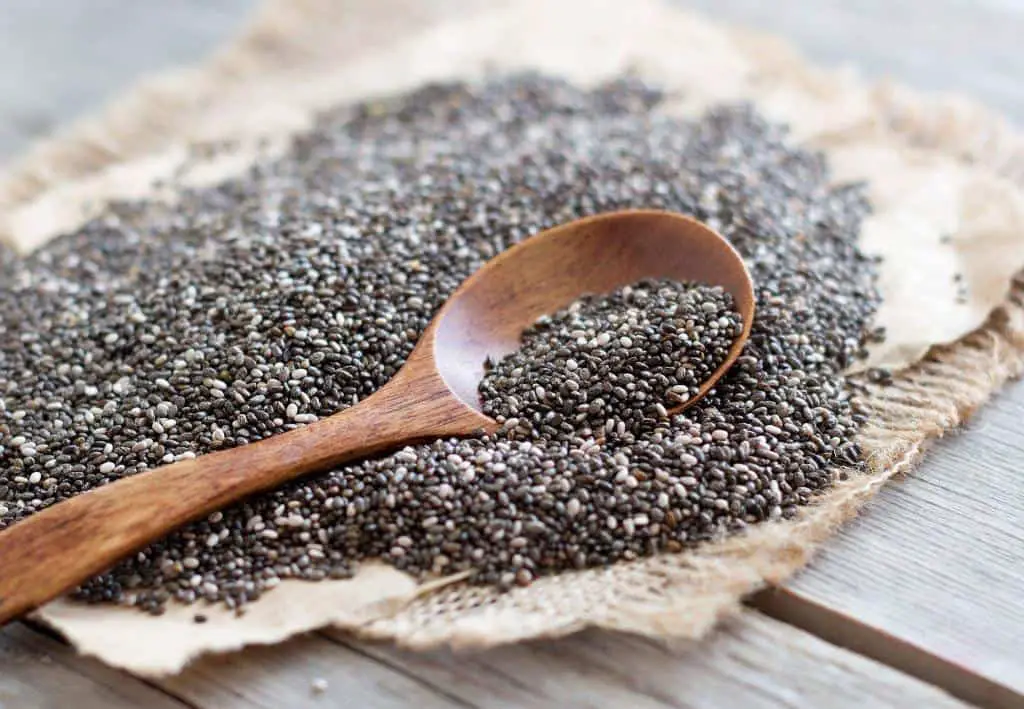
| Nutrient | Chia Seeds (per 1 oz) |
| Calories | 138 |
| Fiber | 10.6g |
| Protein | 4.4g |
| Omega-3 Fatty Acids | 5.1g |
These tiny seeds are particularly renowned for their omega-3 content, which contributes to heart health and overall well-being.
Popular Uses:
- Chia Pudding: Create a delightful and nutritious chia pudding by combining the seeds with your favorite milk and flavors.
- Smoothie Boost: Sprinkle a tablespoon of chia seeds into your morning smoothie for an added nutritional kick.
Psyllium Husk: Nutritional Profile and Benefits
Let’s examine the nutritional content of Psyllium Husk:
| Nutrient | Psyllium Husk (per 1 tbsp) |
| Calories | 20 |
| Fiber | 7g |
Psyllium husk shines as a concentrated source of soluble fiber, crucial for digestive health.
Popular Uses:
- Fiber Supplement: Mix psyllium husk with water or juice as a simple way to increase your daily fiber intake.
- Baking Ingredient: Incorporate psyllium husk into baking recipes for added fiber and improved texture.
Dietary Fiber: The Digestive Powerhouse
Importance of Dietary Fiber
Dietary fiber is the unsung hero of digestive health, working silently but efficiently to keep our gastrointestinal system in top-notch condition. It comes from plant-based foods and is a crucial component that aids digestion and ensures the smooth functioning of our digestive tract.
Types of Fiber in Chia Seeds and Psyllium Husk
When it comes to fiber, not all types are created equal. Chia seeds and psyllium husk boast distinct types of fiber, each with its own unique set of benefits. Let’s break it down:
| Type of Fiber | Chia Seeds | Psyllium Husk |
| Soluble Fiber | Gel-forming fiber that absorbs water | Highly soluble and viscous |
| Insoluble Fiber | Adds bulk to stool for easy passage | Provides roughage for bowel movement |
Understanding the fiber composition helps us grasp how these seeds contribute to digestive health.
How Fiber Aids in Digestion and Overall Well-being
The benefits of fiber extend beyond just aiding digestion. Here’s how it positively impacts our overall well-being:
- Promotes Regular Bowel Movements: Both chia seeds and psyllium husk excel at promoting regular bowel movements, preventing constipation, and ensuring a healthy digestive rhythm.
- Controls Blood Sugar Levels: Soluble fiber, present in abundance in both seeds, slows down the absorption of sugar, helping maintain stable blood sugar levels.
- Supports Weight Management: High-fiber diets are associated with weight management as fiber-rich foods tend to be more filling, reducing overall calorie intake.
- Lowers Cholesterol: Soluble fiber has the added benefit of lowering cholesterol levels, contributing to heart health.
| Also see: Chia Seeds vs Sabja Seeds: Benefits and Uses |
Chia Seeds Benefits for Digestive Health
Exploration of Specific Digestive Benefits
Chia seeds, with their rich nutritional profile, offer several advantages for digestive health:
- Omega-3 Fatty Acids: Beyond fiber, chia seeds are abundant in omega-3 fatty acids, known for their anti-inflammatory properties, which can alleviate digestive discomfort.
- Hydration and Gel Formation: Chia seeds have the unique ability to absorb water, forming a gel-like substance that aids in maintaining hydration and promoting smoother digestion.
The Role of Chia Seeds in Promoting Regular Bowel Movements
Chia seeds’ soluble and insoluble fiber combination ensures they act as a natural laxative, promoting bowel regularity without the need for harsh stimulants. This gentle yet effective approach makes them a digestive ally.
Addressing Potential Digestive Concerns Related to Chia Seeds
While chia seeds are generally well-tolerated, some individuals may experience mild digestive issues. These can include bloating or gas, often attributed to the seeds’ high fiber content. Introducing chia seeds gradually into your diet and ensuring proper hydration can mitigate these concerns.
It is recommended to start with a small amount of chia seeds and gradually increase the dosage while monitoring your body’s response.
Psyllium Husk: A Closer Look at Digestive Uses
Examining Historical and Modern Uses
Psyllium husk, with its roots in ancient Ayurvedic medicine, has a rich history of digestive uses. Traditionally recognized for its role in promoting digestive balance, it has seamlessly transitioned into modern practices.
How Psyllium Husk Supports a Healthy Digestive System
Psyllium husk owes its digestive benefits to its high soluble fiber content. Let’s delve into how this translates into support for a healthy digestive system:
- Forms a Gel-Like Substance: When mixed with water, psyllium husk forms a gel-like substance that aids in bulking up stool, facilitating its smooth passage through the digestive tract.
- Relieves Constipation: Psyllium husk’s natural laxative effect helps relieve constipation without causing dependency, making it a preferred choice for many.
Potential Side Effects or Considerations when Using Psyllium Husk
While generally safe, psyllium husk may pose challenges for some individuals:
- Potential Allergic Reactions: Allergic reactions to psyllium husk are rare but possible. Individuals with known allergies to Plantago ovata should exercise caution.
- Overconsumption Issues: Excessive intake of psyllium husk without adequate water can lead to gastrointestinal issues such as bloating or obstruction. It’s crucial to follow the recommended serving sizes.
To avoid this, it is crucial to follow the recommended dosage instructions provided on the product packaging or consult a healthcare professional for personalized guidance. Additionally, those with underlying gastrointestinal conditions such as diverticulosis should exercise caution while using psyllium husk, as it may aggravate these conditions.
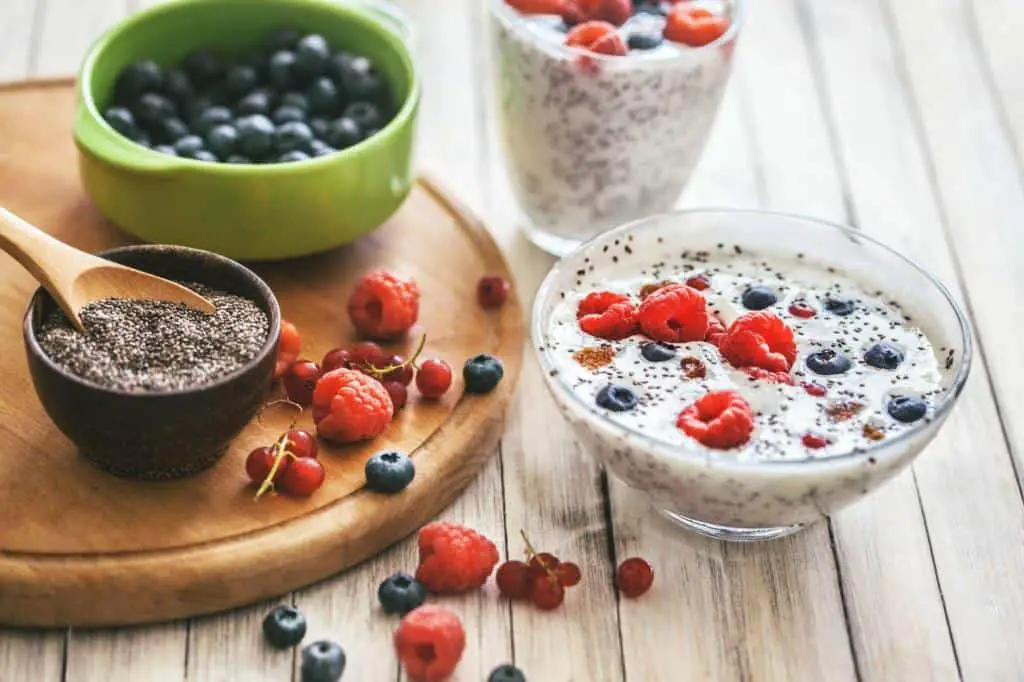
Incorporating Chia Seeds and Psyllium Husk into the Diet:
Chia seeds and psyllium husk can easily be incorporated into your daily meals to reap their digestive health benefits. Here are some delicious ways to include chia seeds in your diet:
1. Chia Pudding: Whip up a nutritious chia pudding by mixing 2 tablespoons of chia seeds with a cup of almond milk or coconut milk, sweetening it with honey or maple syrup if desired. Let it sit in the fridge overnight, and wake up to a delightful breakfast treat packed with fiber.
2. Smoothie Booster: Add a spoonful of chia seeds to your favorite smoothie for an extra nutritional boost and added texture. You can also soak the chia seeds in water before adding them to smoothies, as this helps release their gel-like consistency.
When incorporating psyllium husk into your daily food intake, there are several options worth exploring:
1. Baking Delights: Psyllium husk acts as an excellent binding agent in gluten-free baking recipes such as bread, muffins, or cookies. Replace eggs or use it alongside other flours, like almond flour, for its strong binding properties.
2. Fiber Boost: Simply mix a teaspoon of psyllium husk powder into a glass of water and drink it immediately before bedtime or first thing in the morning on an empty stomach for optimal results.
These creative ideas will not only enhance the taste but also ensure that you’re getting maximum digestive benefits from both superfoods.
Compare Shelf Life: Chia Seeds vs. Psyllium Husk
When comparing the shelf life of chia seeds and psyllium husk, several factors come into play. Chia seeds, known for their rich nutritional profile and versatility, boast a longer shelf life compared to psyllium husk. Chia seeds can last up to 2–4 years when stored properly in a cool, dry place, thanks to their natural antioxidants that help prevent rancidity.
On the other hand, psyllium husk, derived from the Plantago ovata plant, has a shorter shelf life. Typically, psyllium husk can last for about 1-2 years if stored correctly. However, exposure to moisture and air can degrade its quality more rapidly than chia seeds.
Here’s a breakdown of the shelf life of both products:
| Chia Seeds | Psyllium Husk | |
|---|---|---|
| Shelf Life | 2-4 years | 1-2 years |
| Storage Conditions | Cool, dry place | Cool, dry place |
| Susceptibility | Resistant to rancidity | Vulnerable to moisture |
| Nutritional Content | Omega-3 fatty acids, fiber | Soluble and insoluble fiber |
In summary, while both chia seeds and psyllium husk offer various health benefits, chia seeds tend to have a longer shelf life due to their inherent antioxidant properties, making them a more stable pantry staple.
Conclusion
In conclusion, both chia seeds and psyllium husk offer impressive benefits for digestive health. Chia seeds are packed with fiber, omega-3 fatty acids, and antioxidants that support healthy digestion. They can be easily incorporated into various dishes, such as smoothies, salads, or overnight oats, to add a nutritional boost.
On the other hand, psyllium husk is renowned for its unparalleled fiber content and ability to regulate bowel movements effectively. It absorbs water and forms a gel-like substance in the intestines, promoting regularity and alleviating constipation.
When it comes to choosing between chia seeds and psyllium husk as the ultimate superfood for digestive health, it ultimately depends on personal preferences and specific needs. Some may prefer the versatility of chia seeds, while others may appreciate the potent effects of psyllium husk.
However, it is important to consult with healthcare professionals before making any significant dietary changes or adding new superfoods to your routine. They can provide personalized advice based on individual health conditions or medications being taken.
Remember – maintaining good digestive health involves more than just consuming superfoods alone. A well-rounded approach that includes a balanced diet rich in fruits, vegetables, whole grains, staying adequately hydrated, and exercise will significantly contribute to overall gastrointestinal wellbeing.

